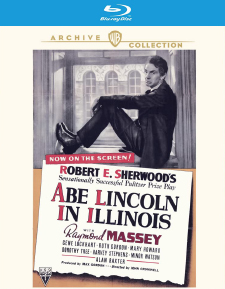Abe Lincoln in Illinois (Blu-ray Review)

Director
John CromwellRelease Date(s)
1940 (September 13, 2022)Studio(s)
RKO Radio Pictures (Warner Archive Collection)- Film/Program Grade: B-
- Video Grade: A
- Audio Grade: A
- Extras Grade: C-
Review
Abe Lincoln in Illinois is based on the Pulitzer Prize-winning play by Robert E. Sherwood with Raymond Massey reprising the title role. The film focuses on episodes in Lincoln’s life from when he was a poor backwoodsman in 1831 to his election in 1860 as the sixteenth President of the United States.
The opening scene shows Abe agreeing to journey with a boatload of hogs to sell in New Orleans and his stepmom (Elisabeth Risdon) reminding him to read the Bible for wisdom. On a stop in New Salem, Illinois, he meets Ann Rutledge (Mary Howard) and falls in love. He soon settles in New Salem to work as a storekeeper’s clerk just to be near Ann.
Abe wins the respect of the locals when he beats the loudmouthed town bully Jack Armstrong (Howard Da Silva). The townsfolk recruit Abe to be postmaster and politicians then talk him into running for the State Assembly. He wins, but Ann soon dies and leaves him heartbroken. Depressed and disinclined to public office, he leaves the legislature after only one term to study and practice law, and meets Mary Todd (Ruth Gordon). They eventually marry despite her family’s objections to her marrying a poor man well beneath their social status. An ambitious woman bent on becoming America’s first lady, Mary goads Abe to re-enter politics.
A highlight of the film is Lincoln’s debate with Stephen Douglas (Gene Lockhart), an established politician. Abe makes the impassioned “House Divided” speech and is elected to Congress. Later, running for President, he realizes that if he is elected, the South will secede.
Director John Cromwell covers these events in Lincoln’s life to illustrate his rise from anonymity to the Presidency despite his disdain for politics. Too often, Sherwood’s screenplay is preachy and treats life as a Sunday school morality play. Lincoln is treated as an icon rather than a man with human failings. His romance with Ann, supposedly his great love, is treated perfunctorily. There’s little chemistry between Massey and Howard and their characters’ love for each another is poorly conveyed.
By the time Massey starred in the picture, he had played Lincoln on Broadway and on tour across the country. With a slow, thoughtful manner of speaking often peppered with aphorisms attributed to the President, Massey’s portrayal is very convincing. His facial structure is similar to Lincoln’s and a nose appliance helps him to look like a young version of the President. It’s a shame the script is content to hit events generally known without delving deeper.
Ruth Gordon, an established stage actress making her screen debut, gives a spirited portrayal of Mary Todd as the power behind the man. Dressed in frills and finery, she has the appearance of a genteel, well-bred society woman. But the silk and ruffles are a veneer for a woman with driving ambition. She sees in Abe a quality he might not yet perceive in himself and urges him on to realize his full potential. Gordon portrays Mary as blunt, focused, and determined, qualities that were not regarded as befitting a proper lady. The script suggests that Abe’s marriage to Mary may have been more for her ambition and his convenience than love.
Abe Lincoln in Illinois was shot by director of photography James Wong Howe on 35 mm black-and-white film with spherical lenses, finished photochemically, and presented in the aspect ratio of 1.37:1. The picture quality on Warner Archive’s Blu-ray release is quite good, with no scratches, surface dirt, reel cue marks, or emulsion clouding. Contrast is fine, with a pleasing greyscale, and deep blacks. Details in Mary Todd’s dresses, items on shelves in the general store, Lincoln’s tousled hair, and leaves on trees are nicely delineated.
The soundtrack is English 2.0 Mono DTS-HD Master Audio. Optional English SDH subtitles are available. Dialogue throughout is clear and distinct, with Massey’s delivery more deliberate and slower than the other actors’. In the debate with Stephen Douglas, Gene Lockhart speaks in stentorian tones, while Massey adopts a more folksy delivery. There are sounds of body pummeling and onlookers’ cheers during a fight between Lincoln and braggart Jack Armstrong. Cheering is heard from the audience when Lincoln speaks. The Battle Cry of Freedom is interpolated into Roy Webb’s score, and in the final scene, The Battle Hymn of the Republic is played.
Bonus material includes the following:
- Lux Radio Theater Broadcast (59:57)
Airing on April 22, 1940, this radio program starred Raymond Massey as Abe Lincoln and Fay Bainter as Mary Todd. The program was introduced and narrated by Cecil B. DeMille.
Abe Lincoln in Illinois opens up the stage play to include several outdoor scenes but fails to fully exploit cinematic techniques to create more action and excitement. The film never establishes dramatic tension, as scene after scene proceeds on the same neutral level, rehashing the bits of knowledge we all learned in elementary school. Though the film is a worthy showcase for Raymond Massey’s Academy Award-nominated performance, Abe Lincoln in Illinois does little more than coast on a folklore-ish interpretation.
- Dennis Seuling

